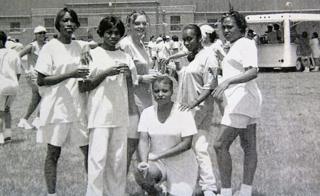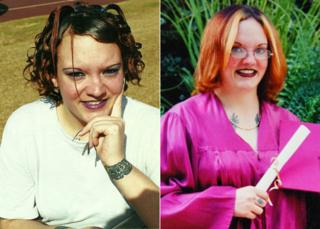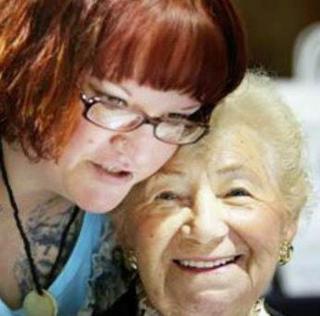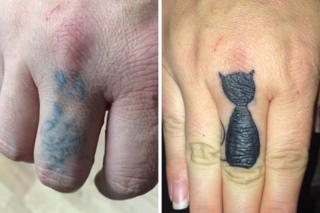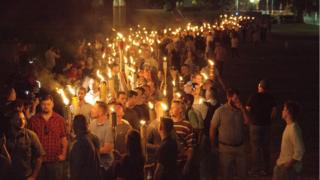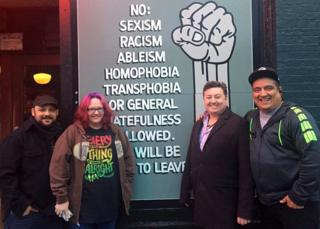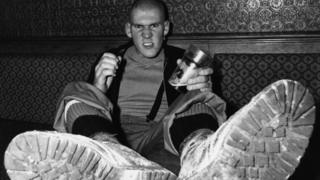Y'all ain't ready for THIS one... 
:whatyoumean::GoatHolcomb:
I was a neo-Nazi. Then I fell in love with a black woman
By Claire Bates BBC World Service
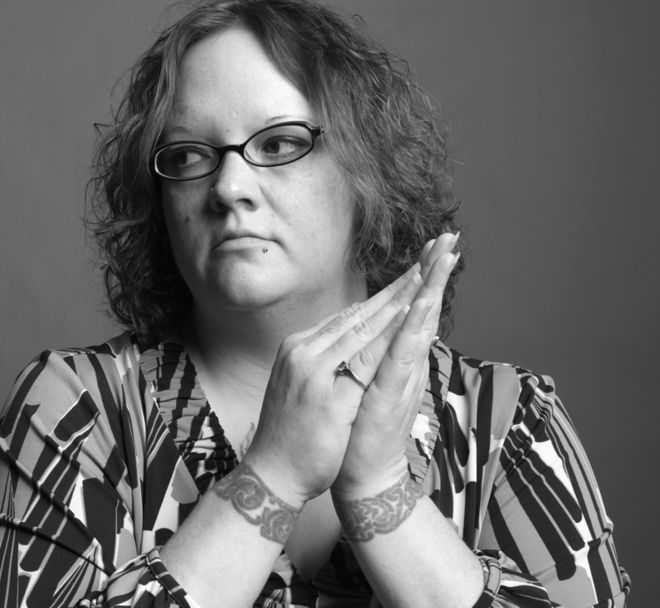 Mark Seliger
Mark Seliger
She was a violent white supremacist. But an encounter in prison changed her life forever.
Angela King had gone to the bar expecting trouble. The neo-Nazi had arrived at the local dive in South Florida with a gang of violent skinheads.
King, 23, sauntered in with a 9mm pistol in the waistband of her jeans. She and her friends wore combat boots and coloured braces, their skin emblazoned with racist iconography.
"I had tattoos all over my body. I had Vikings tattooed on my chest, a swastika on my middle finger and 'Sieg Heil' on the inside of my bottom lip, which was the Hitler salute," King says.
They hated black people and Jews and were also virulently homophobic. Plus, one of them was her boyfriend. So King didn't dare to admit that she was secretly gay.
As the group drank they became louder and more aggressive. A large brawl broke out after a man ordering a drink took exception to King's boyfriend.
"He said something about his tattoo and that was it. It took nothing to get my boyfriend swinging," King says.
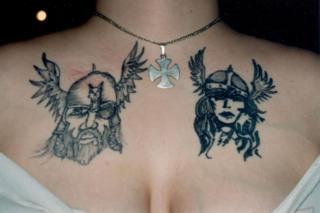
Angela's tattoos, like those of other white supremacists, were inspired by Norse mythology
King and another woman from her group grabbed the man's companion and beat her up in the bathroom. They fled after hearing the police had been called.
"We drove around all pumped up and started talking about what a race war would be like in the US," she says.
"We talked about how it was OK to hurt people who aren't like us and we decided to go and find a place to rob."
They settled on a convenience store, but farcically it had closed while they argued about who should go in. They eventually targeted an adult video shop, reasoning that pornography "wasn't beneficial to the white race".
"One of the guys went in and pistol-whipped the clerk before stealing money from the register," King says. The clerk was Jewish.
Find out more
But she had a secret that left her confused, angry and resentful.
"From very early on I felt I was abnormal because I was attracted to people of the same sex," King says.
King kept her sexual identity hidden.
"I knew I had to keep it to myself. My mother used to say to me, 'I will never stop loving you... except you better never bring home a black person or a woman."
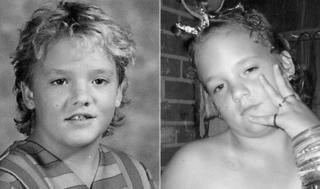
Angela hid her sexual identity when she was growing up
King started going to public school when she was 10 after her family moved. She struggled with her weight and self-confidence, and was called names by fellow students. When verbal bullying became physical, she finally snapped.
"When I was 13 a girl ripped open my shirt in front of the entire class," she says.
"I was in a training bra and felt completely humiliated. It just blew the lid off the anger and rage I had been holding on to for so long."
King fought back and realised violence and aggression gave her a sense of control that she had never felt before. She soon became established as the school and neighbourhood bully.
Her parents divorced and while she and her sister stayed with their mother, their brother went to live with her father. Desperate to belong, she joined a group of teenagers into punk rock who were starting to flirt with neo-Nazism.
"These younger skinheads were known as 'fresh cuts'," King says.
"I joined them because they accepted my violence and anger without question."
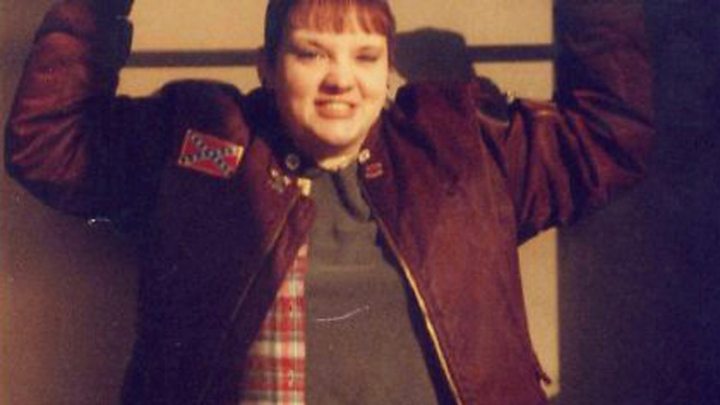
Listen to Angela King explain how her opinions on race "crumbled away" in prison
The group pasted racist flyers around neighbourhoods at night and started fights with anyone who disagreed with them.
King assumed she had found the right path, because many of their views reflected the casual racism and prejudice she had heard at home.
King was proud of her new identity and wore it "like a mantle" each day. Despite this, little action was taken at school.
In one earth science lesson she put a swastika flag on a model she had built of a moon base. It was left on display for weeks before anyone noticed.
Although the model was taken down, King still received a B grade for it after her mother argued she had the right to freedom of speech. Her parents didn't object to her beliefs, but warned her she was "too blatant about them."
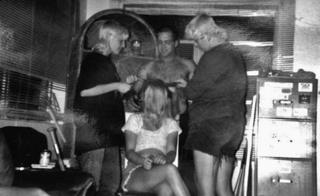
Angela, right, shaving the head of a girl dating a skinhead in her group
King began to hang out with older skinheads and joined a violent white extremist group in her teens.
"They told me that Jews had owned the slave ships and had brought black people to America to endanger the white race.
"It sounds ridiculous but when you are uneducated or trying to fit in, you soak up the new reality like a sponge."
King was asked to leave her school when she was 16 and went to work in various fast food restaurants. Her mother eventually kicked her out for causing too much trouble and she slept in cars and on friends' sofas.
It was around this time, in 1998, that King was involved in the robbery of the adult video shop. Soon afterwards she fled to Chicago with her boyfriend who was wanted for another hate crime. However, she was arrested weeks later and taken to the Federal Detention Centre in Miami.
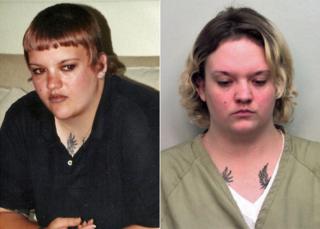
Angela was sentenced for robbery in February 1999
It was the first time she had lived in close quarters with people from different cultures and backgrounds.
"People knew why I was in there and I got dirty looks and comments. I assumed I would spend my time with my back to the wall, fighting," King says.
What King did not expect was the hand of friendship - especially from a black woman.
"I was in the recreation area smoking when a Jamaican woman said to me, 'Hey, do you know how to play cribbage?'" King had no idea what it was and was taught to play.
It was the start of an unlikely friendship and King found her racist belief system crumbling as a result. Her friendship circle widened as she was taken under the wing of a wider group of Jamaican women, some of whom had been convicted for carrying drugs into the US.
"I hadn't really known any people of colour before, but here were these women who asked me difficult questions but treated me with compassion," King says.
With their help, she started to take responsibility for her past actions.
During her first year in the detention centre she was tipped off that a newspaper article was coming out about her case. She told one of her new friends how worried she was about the publicity.
"My friend had a job that meant she got out early to help prepare breakfast. The day it came out she stole the paper and hid it so no-one could read it. She, a black woman, did that for me, an ignorant white woman who was inside for a hate crime."

:whatyoumean::GoatHolcomb:
I was a neo-Nazi. Then I fell in love with a black woman
By Claire Bates BBC World Service

She was a violent white supremacist. But an encounter in prison changed her life forever.
Angela King had gone to the bar expecting trouble. The neo-Nazi had arrived at the local dive in South Florida with a gang of violent skinheads.
King, 23, sauntered in with a 9mm pistol in the waistband of her jeans. She and her friends wore combat boots and coloured braces, their skin emblazoned with racist iconography.
"I had tattoos all over my body. I had Vikings tattooed on my chest, a swastika on my middle finger and 'Sieg Heil' on the inside of my bottom lip, which was the Hitler salute," King says.
They hated black people and Jews and were also virulently homophobic. Plus, one of them was her boyfriend. So King didn't dare to admit that she was secretly gay.
As the group drank they became louder and more aggressive. A large brawl broke out after a man ordering a drink took exception to King's boyfriend.
"He said something about his tattoo and that was it. It took nothing to get my boyfriend swinging," King says.

Angela's tattoos, like those of other white supremacists, were inspired by Norse mythology
King and another woman from her group grabbed the man's companion and beat her up in the bathroom. They fled after hearing the police had been called.
"We drove around all pumped up and started talking about what a race war would be like in the US," she says.
"We talked about how it was OK to hurt people who aren't like us and we decided to go and find a place to rob."
They settled on a convenience store, but farcically it had closed while they argued about who should go in. They eventually targeted an adult video shop, reasoning that pornography "wasn't beneficial to the white race".
"One of the guys went in and pistol-whipped the clerk before stealing money from the register," King says. The clerk was Jewish.
Find out more
- Angela King spoke to Outlook on BBC World Service. Listen to the interview
- Get the Outlook podcast for more extraordinary real-life stories
But she had a secret that left her confused, angry and resentful.
"From very early on I felt I was abnormal because I was attracted to people of the same sex," King says.
King kept her sexual identity hidden.
"I knew I had to keep it to myself. My mother used to say to me, 'I will never stop loving you... except you better never bring home a black person or a woman."

Angela hid her sexual identity when she was growing up
King started going to public school when she was 10 after her family moved. She struggled with her weight and self-confidence, and was called names by fellow students. When verbal bullying became physical, she finally snapped.
"When I was 13 a girl ripped open my shirt in front of the entire class," she says.
"I was in a training bra and felt completely humiliated. It just blew the lid off the anger and rage I had been holding on to for so long."
King fought back and realised violence and aggression gave her a sense of control that she had never felt before. She soon became established as the school and neighbourhood bully.
Her parents divorced and while she and her sister stayed with their mother, their brother went to live with her father. Desperate to belong, she joined a group of teenagers into punk rock who were starting to flirt with neo-Nazism.
"These younger skinheads were known as 'fresh cuts'," King says.
"I joined them because they accepted my violence and anger without question."

Listen to Angela King explain how her opinions on race "crumbled away" in prison
The group pasted racist flyers around neighbourhoods at night and started fights with anyone who disagreed with them.
King assumed she had found the right path, because many of their views reflected the casual racism and prejudice she had heard at home.
King was proud of her new identity and wore it "like a mantle" each day. Despite this, little action was taken at school.
In one earth science lesson she put a swastika flag on a model she had built of a moon base. It was left on display for weeks before anyone noticed.
Although the model was taken down, King still received a B grade for it after her mother argued she had the right to freedom of speech. Her parents didn't object to her beliefs, but warned her she was "too blatant about them."

Angela, right, shaving the head of a girl dating a skinhead in her group
King began to hang out with older skinheads and joined a violent white extremist group in her teens.
"They told me that Jews had owned the slave ships and had brought black people to America to endanger the white race.
"It sounds ridiculous but when you are uneducated or trying to fit in, you soak up the new reality like a sponge."
King was asked to leave her school when she was 16 and went to work in various fast food restaurants. Her mother eventually kicked her out for causing too much trouble and she slept in cars and on friends' sofas.
It was around this time, in 1998, that King was involved in the robbery of the adult video shop. Soon afterwards she fled to Chicago with her boyfriend who was wanted for another hate crime. However, she was arrested weeks later and taken to the Federal Detention Centre in Miami.

Angela was sentenced for robbery in February 1999
It was the first time she had lived in close quarters with people from different cultures and backgrounds.
"People knew why I was in there and I got dirty looks and comments. I assumed I would spend my time with my back to the wall, fighting," King says.
What King did not expect was the hand of friendship - especially from a black woman.
"I was in the recreation area smoking when a Jamaican woman said to me, 'Hey, do you know how to play cribbage?'" King had no idea what it was and was taught to play.
It was the start of an unlikely friendship and King found her racist belief system crumbling as a result. Her friendship circle widened as she was taken under the wing of a wider group of Jamaican women, some of whom had been convicted for carrying drugs into the US.
"I hadn't really known any people of colour before, but here were these women who asked me difficult questions but treated me with compassion," King says.
With their help, she started to take responsibility for her past actions.
During her first year in the detention centre she was tipped off that a newspaper article was coming out about her case. She told one of her new friends how worried she was about the publicity.
"My friend had a job that meant she got out early to help prepare breakfast. The day it came out she stole the paper and hid it so no-one could read it. She, a black woman, did that for me, an ignorant white woman who was inside for a hate crime."
